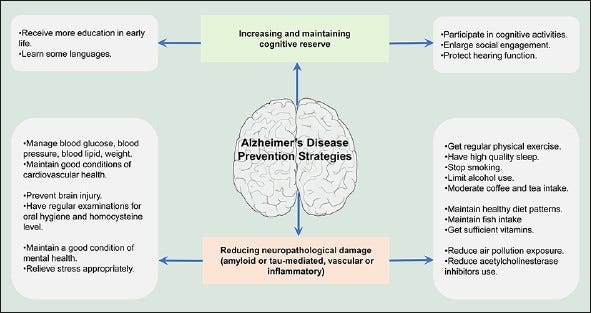Strategies for Reducing Alzheimer's Disease Risk Effectively
Written on
Understanding Alzheimer's Disease
Alzheimer’s disease (AD) presents a complex challenge. While the well-known plaques and tangles are part of the picture, they do not tell the whole story. The breakdown of the blood-brain barrier, heightened oxidative stress, dysfunctional mitochondria, impaired glucose metabolism, damaged microglia, disrupted serotonin signaling, and inflammation are all issues that can arise in a brain affected by AD. Despite significant research, many aspects of this condition remain elusive.
When evaluating risk factors for AD, the situation is similarly multifaceted. Numerous genetic and lifestyle factors—including diet, physical activity, and sleep—can influence your likelihood of developing AD as you age, with age being the most significant risk factor. Furthermore, these elements often interact; for instance, individuals carrying the APOE4 gene variant may be particularly susceptible to dietary influences and inflammation.
This complex interplay might seem daunting, but it's essential to recognize that while some risk factors are beyond our control (like genetics), others are manageable (such as diet and exercise). By focusing on controllable factors, we may be able to mitigate the impact of those we cannot.
What Steps Can Be Taken?
Recently, I encountered a comprehensive review summarizing the latest epidemiological findings on AD prevention. Before diving into specific recommendations, it’s worth noting that while epidemiology is valuable, it has limitations. It often deals with large populations and averages, which can overlook individual variations and fail to establish causation, as confounding factors may skew results. However, the following guidelines are drawn from correlations found in extensive studies and can serve as a solid foundation for most individuals looking to lower their AD risk.

Part I: Cognitive Engagement
Building a cognitive reserve may not completely prevent AD, but it can delay the onset of symptoms. Engaging in activities that stimulate your brain is key. Consider these suggestions:
- Pursue education (indicative of a desire to learn)
- Learn a new language
- Read, solve puzzles, and engage in social activities
- Protect your hearing, as hearing loss can correlate with decreased social interaction and may lead to brain volume loss.
Part II: Healthy Lifestyle Choices
The fundamentals of a healthy lifestyle are timeless:
- Regular physical activity
- Adequate sleep
- Avoiding smoking
- Limiting alcohol consumption
- Managing mental health and stress
- Moderate coffee or tea intake (2–3 cups of coffee; potentially more tea)
Focus on a nutritious diet:
- Incorporate fish or omega-3 supplements
- Ensure sufficient vitamin intake
- Limit exposure to air pollutants
- Avoid acetylcholinesterase inhibitors, which, while beneficial in treating cognitive symptoms in AD patients, can increase risks for healthy individuals.
While the term "healthy dietary pattern" is broad, diets like the Mediterranean, DASH, and MIND have shown promise in promoting cognitive health. The importance of dietary habits is particularly pronounced for APOE4 carriers, as indicated by research showing that regular seafood consumption is linked to lower AD brain pathology among this group.
The ketogenic diet, although still debated, shows potential for alleviating symptoms in AD patients, primarily by addressing faulty energy metabolism.
Part III: Damage Control
Recognizing that the body operates as an integrated system, it's crucial to consider various health factors for AD prevention:
- Maintain balanced blood sugar, lipid levels, and blood pressure
- Achieve a healthy weight
- Prioritize cardiovascular health
- Prevent brain injuries
- Maintain oral hygiene, as periodontal inflammation is associated with higher AD risk
- Monitor homocysteine levels, as elevated levels may relate to various health concerns.
The review concludes with actionable insights:
Policies promoting education, social engagement, and cognitive activities should be prioritized. Managing existing health conditions and sustaining a healthy lifestyle are crucial in preventing AD. Moreover, environmental protection, particularly from air pollutants, is vital for AD prevention.
Stay healthy.
Thank you for reading! If you’re interested in exploring broader concepts in science, philosophy, and technology, consider subscribing to my newsletter, Thinking Ahead.
Discover three essential tips to lower your Alzheimer's disease risk in this Mayo Clinic Minute video.
Learn how addressing risk factors can help prevent Alzheimer's disease in this informative video.